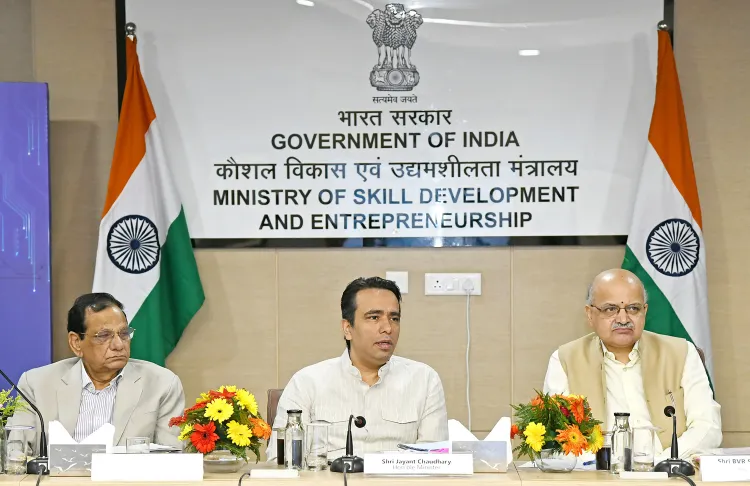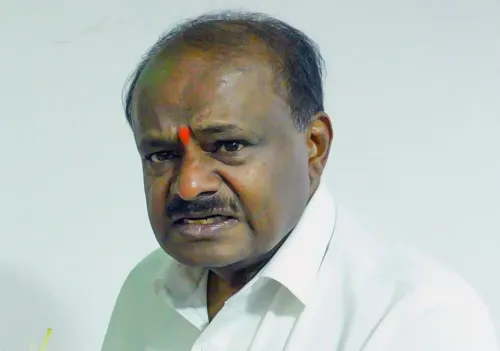How is NITI Aayog Planning to Empower 490 Million Informal Workers with AI?

Synopsis
Key Takeaways
- NITI Aayog released a study focusing on AI for informal workers.
- The initiative aims to support 490 million informal workers in India.
- Collaboration across sectors is crucial for success.
- The proposed Mission Digital ShramSetu will create an enabling ecosystem.
- AI is seen as a tool for increasing productivity and dignity in work.
New Delhi, Oct 8 (NationPress) NITI Aayog has made a significant announcement on Wednesday by releasing an innovative study aimed at thoroughly investigating how artificial intelligence (AI) and cutting-edge technologies can be utilized to enhance the lives and livelihoods of India’s 490 million informal workers, who play a crucial role in the country's economy.
While the global dialogue surrounding AI has predominantly focused on white-collar roles and the formal economy, this groundbreaking study named ‘AI for Inclusive Societal Development’, created in collaboration with Deloitte, redirects attention to the informal sector. This sector contributes nearly half of India’s GDP but often lacks access to formal systems of protection, opportunity, and productivity.
Jayant Chaudhary, the Minister of State (Independent Charge) for Skill Development and Entrepreneurship, and Minister of State for Education, stated, “Empowering India’s informal workers is not only an economic priority; it is a moral obligation.”
“The objective of Digital Skilling in AI for workers seamlessly aligns with our national skilling agenda, utilizing AI and advanced technologies to create adaptive, accessible, and demand-driven learning opportunities. By uniting government, industry, and civil society, this initiative will ensure that every worker—be it a farmer, artisan, or healthcare aide—acquires the necessary skills, tools, and opportunities to flourish in the emerging digital economy,” the minister emphasized.
The report highlights that AI will not spontaneously reform the informal sector. Technology alone cannot dismantle systemic obstacles. Without intentional human intervention, targeted investments, and a supportive ecosystem, the advantages of AI may remain elusive for those who require it the most.
In response, NITI Aayog has proposed the Mission Digital ShramSetu—a national initiative aimed at developing a roadmap and ecosystem to make AI accessible, affordable, and impactful for every worker.
This mission intends to leverage AI, blockchain, immersive learning, and other advanced technologies to eliminate structural barriers, which include financial uncertainty, restricted market access, and insufficient skills and social protection. It aims to empower informal workers by providing them with tools and platforms that enhance their skills, boost productivity, and ensure dignity in their work.
This proposed mission underscores that fostering inclusion requires human intent, coordinated action, and collaboration among government, industry, academia, and civil society. Only through these efforts can AI act as a true equalizer—lifting millions on the margins into the core of India’s growth narrative and actualizing the vision of Viksit Bharat 2047.
B.V.R. Subrahmanyam, the CEO of NITI Aayog, stated, “If we are serious about transforming the lives of India’s 490 million informal workers, collaboration is not just an option—it is essential.”
“Achieving this goal requires cross-functional efforts: from targeted R&D aimed at reducing the costs of advanced technologies to establishing a sustainable innovation ecosystem tailored for the informal sector, as well as widespread skilling and reskilling initiatives. Only by uniting government, industry, academia, and civil society can we ensure that this mission results in not just technology adoption, but genuine and lasting empowerment,” Subrahmanyam remarked.
Debjani Ghosh, Distinguished Fellow at NITI Aayog and Chief Architect of the Frontier Tech Hub, emphasized that for India to realize its $30 trillion 'Viksit Bharat 2047' goal, it cannot afford to neglect the 490 million workers who drive our economy daily.
“AI will not revolutionize their lives independently—it necessitates a dedicated effort to construct the roadmap and ecosystem that render these technologies accessible and affordable. This roadmap is distinctive because it finally prioritizes their voices, challenges, and aspirations in the AI discourse and outlines a mission-driven approach as the pathway to actualize this promise,” Ghosh added.









